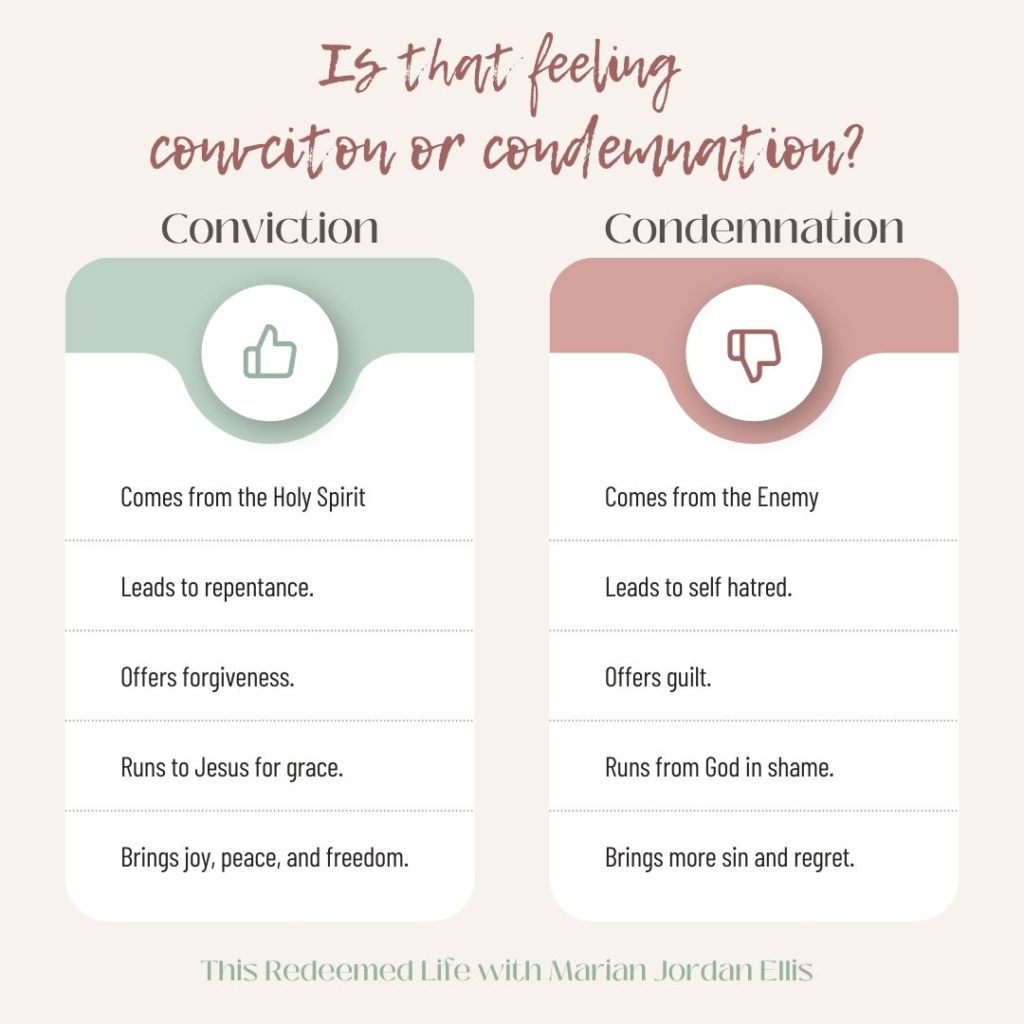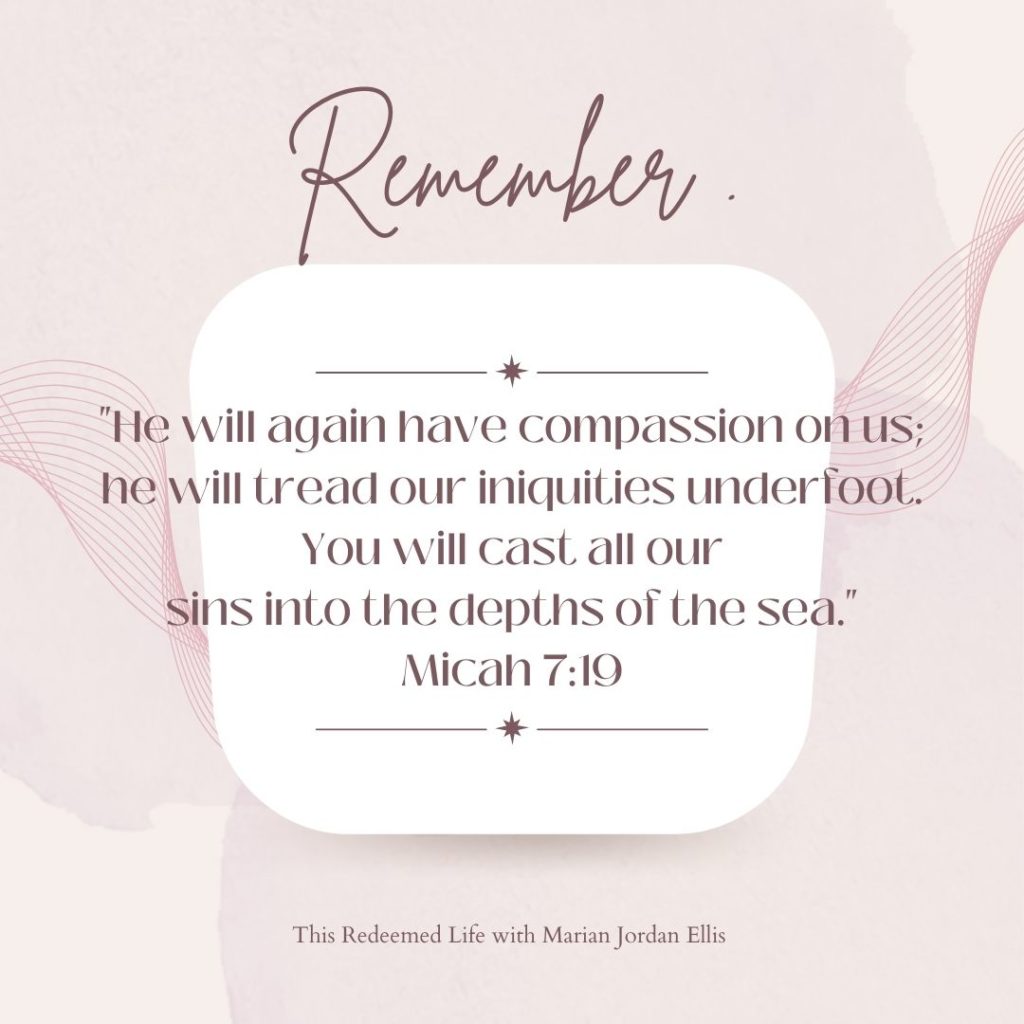Is that guilt conviction of sin or condemnation of the enemy?
I’d blown it. I said something that I couldn’t take back. As soon as I uttered the sentence, I regretted it. My words were unnecessary, not helpful, and certainly weren’t kind. My words failed the litmus test outlined in Ephesians for the kind of speech that glorifies God. (Ephesians 4:29-30)

For the next few hours, I tried to suppress the memory of the moment when my foot entered my mouth. Sure, I was embarrassed, but there was something more going on in my heart. I knew my words didn’t honor the Lord. Yet, try as I may, I couldn’t shake the weight that hung over me. I felt guilty.
Have you ever experienced this feeling? When you know you’ve done wrong, you know you acted in a way that wasn’t glorifying to God? When the pang of guilt strikes, how do we discern if the feeling is conviction of sin or condemnation? How do we know the difference? These are two vastly different experiences.
First, the conviction of sin is when the Holy Spirit reveals an area of sin (pride, jealousy, anger, lust, lying, selfishness) for which we need to confess and repent. Conviction leads us to run to God for grace and forgiveness.Shame, however, is when our enemy (the Devil) speaks words of failure and fear over our lives. Shame leads us to run away from God in dread of punishment. Shame doesn’t deal with the sin; it just tells us we are unforgiven, smothers out your love for God, and quenches the power of the Holy Spirit.
It’s vital that we know the difference between shame and condemnation. To discern which one we are experiencing, I want to talk about what happens after we’ve blown it.


In that space of time after we sin, the Holy Spirit (who resides in every Believer) stirs conviction in our hearts. Conviction may feel like a nudge that says, “that was wrong.” Or heaviness on the heart that doesn’t shake. Conviction could also come as a thought where you remember a specific scripture passage that applies to the event. For example, shortly after I said the unkind words, the verse from Ephesians popped in my head.
These feelings or thoughts are simply God’s way of showing us that we behaved in a way that isn’t consistent with our identity as His child or that we’ve stepped outside of His will. God doesn’t convict us to shame us; instead, He convicts us to lead us to repentance. Repentance of sin is the key to joy, freedom, and the incredible power of God to overcome temptation the next time we face the same scenario.
Repent, then, and turn to God, so that your sins may be wiped out, that times of refreshing may come from the Lord. Acts 3:19
Let’s pause and think about our feelings of guilt or remorse because here’s what many people would say.
“It’s no big deal. Just ignore it.”
“Jesus forgives you. Don’t worry about it.”
Some may even quote the scripture, “There’s no condemnation for those who are in Christ Jesus.” (Romans 8:1)
Friend, let me say this very clearly, “Yes, our sins will be forgiven!” God’s grace is abundant and amazing! But the Lord wants us to come to Jesus and experience the grace our hearts need to be free from the burden of sin and to experience the relief that comes with repentance. Conviction has a glorious purpose, which, if we allow it to do its work, brings about something beautiful the Lord wants to do in our lives.
That day I said those unkind words to a friend, I recognized the need to repent. First, I told Jesus that I was sorry for what I said. Confession of sin means that we agree with God. I told God that my words were unkind, unhelpful, and unnecessary. Then I confessed to the person I hurt because I knew true repentance would make it right with the one I had wronged.
And guess what? When I did both things, I felt free. The guilt was gone.
A few days later, I did have a moment where the enemy tried to remind me of the event. This time the heaviness was coupled with words of “how could you… you are such a hypocrite.” That, my friends, is the voice of shame. Satan tried to bring back to my mind my failure so I would believe his lies that God didn’t love me or the lie that I was not forgiven.
As those shameful thoughts entered my mind, I spoke out loud that I was “covered by the blood of Jesus and He had forgiven me.” As I did, the voice of shame lifted, and I was free from the Accuser.
That’s how we know if we are dealing with shame or condemnation.
If you gave the mistake to Jesus, then trust you are forgiven! He says, “It is finished!” Shame wants to bring up the past, and dwell on stuff God cast into the deepest ocean.


Friend, I pray this encourages you to run to Jesus! You will find grace in His arms. And when you do, stand confident in His love and tell the one who condemns you that Jesus says your debt wiped clean!
For His Glory,
Marian
Copyright 2022 Marian Jordan Ellis










